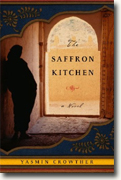The Saffron Kitchen
Yasmin Crowther
book reviews:
· general fiction
· chick lit/romance
· sci-fi/fantasy
· graphic novels
· nonfiction
· audio books
· author interviews
· children's books @
curledupkids.com
· DVD reviews @
curledupdvd.com
newsletter
win books
buy online
links
home
for authors
& publishers
for reviewers

 |
The Saffron Kitchen Yasmin Crowther Viking Hardcover 272 pages December 2006 |
|
Maryam, the young daughter of an Iranian general, wants a different life from the one envisioned for her by her father. A man of influence, her father begins arranging a marriage for his beautiful sixteen-year-old daughter while Maryam longs for a life of adventure and to be a nurse. Her strong will and dreams cause her to be unsettled with her life and longing for freedom.
In present-day London, the arrival of Saeed, Maryam’s young nephew, sets off a chain of events with roots extending back forty years. Maryam flees to her past in Iran, leaving her daughter Sara behind to piece together long hidden secrets while caring for Saeed and her father. Yasmin Crowther’s The Saffron Kitchen is set during the U.S.-backed 1953 coup that toppled Iran’s Prime Minister Mossadegh. As the daughter of one of the Shah’s generals, Maryam’s willful behavior causes shame for her father, an act which he is unable to forgive. His retribution is swift and fierce, setting off a deadly chain of consequences. Maryam’s story is one of repression and a struggle for identity; she seeks a chance to be heard in a culture where her only value is as a bride and mother: “I thought of Zohreh, the deaf and dumb girl in Ehzat’s story and wondered whether I would ever be permitted to use the voice with which I had been born.” Her punishment and subsequent banishment effectively silence Maryam for decades. Even though she constructs a life in England and livs within a family, the violence in her history causes her to be cold and distant – a woman without country or identity. Despite her history, Maryam’s belief that punishment made her strong and able to survive leads her to lash out at the weakness she perceives in Saeed. This act of aggression perpetuates the cycle of family violence and is the catalyst for change. The Saffron Kitchen is told in the alternating voices of Sara and Maryam, moving through time to piece together Maryam’s fragmented story. The reader shares Sara’s quest to understand her mother and shares her anger at the wake of destruction which follows Maryam’s path. Readers will feel horror at what Maryam lived through; however, Crowther makes the difficult choice to allow readers to feel outrage and anger toward her protagonist. Through this, Crowther forces readers to confront their own stereotypes and assess how individual choices affect family and friends, and eventually, to understand and accept Maryam’s decisions. Yasmin Crowther shows exceptional promise with The Saffron Kitchen. It is difficult to fathom that such a strong voice is portrayed in a first novel. Where her inexperience shows is in balancing Maryam and Sara’s voices. Sara, unfortunately, is not an equal player and functions as a mechanism to move her mother’s story forward. Originally published on Curled Up With A Good Book at www.curledup.com. © Janelle Martin, 2006 |
|
|
|
 Click here to learn more about this month's sponsor! |
|
| fiction · sf/f · comic books · nonfiction · audio newsletter · free book contest · buy books online review index · links · · authors & publishers reviewers |
|
| site by ELBO Computing Resources, Inc. | |
 As violence erupts in her hometown, Maryam is left behind in the family compound. In her desperation, she leaves safety to seek shelter with her father’s assistant Ali, for whom she secretly harbors feelings. Her return to the family home is noted by a family servant and - her secret out - she is summarily banished while Ali is brutally punished.
As violence erupts in her hometown, Maryam is left behind in the family compound. In her desperation, she leaves safety to seek shelter with her father’s assistant Ali, for whom she secretly harbors feelings. Her return to the family home is noted by a family servant and - her secret out - she is summarily banished while Ali is brutally punished.